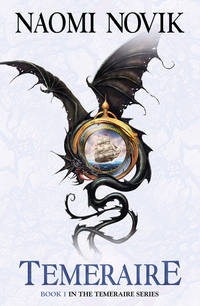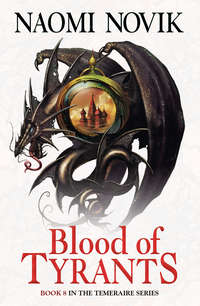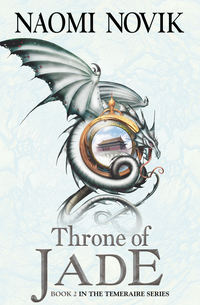
Полная версия
Tongues of Serpents
‘There is Caesar’s breakfast,’ Temeraire said, with a sigh, as the mournful lowing of a cow came towards them from the bottom of the hill; but when it was brought up, by an only slightly less reluctant youth, he delivered it not to Caesar but to them, stammering compliments of Mr. MacArthur, and for Laurence there was an invitation card, asking him to supper.
‘I wonder he should make such a gesture,’ Laurence said, rather taken aback: it was one thing for MacArthur to bring himself to the covert, however irregularly organized, in an official outpost — but quite another to invite Laurence to his home in mixed company likely overseen by his wife. ‘I wonder at it indeed; unless,’ he added, low, ‘he has had some intelligence of Rankin’s interest in Bligh’s case: that might make sufficient motive even for this.’
‘Umm,’ Temeraire said indistinctly, nibbling around a substantial thigh-bone his attention fixed notably on Gong Su’s enthusiastic preparations: the cow had been butchered, and was going into the earth with what greenstuffs had passed muster and some cracked wheat; even Caesar had peeled open an eye and was looking over with covert interest.
The hour was fixed sufficiently late that they could wait until the heat of the day had passed and travel at the beginning of twilight; Temeraire, having made a splendid meal, carried him aloft into the softening but yet unbroken blue: no clouds, yet again, all the day. What would have made an hour’s journey on horse, across rough country, was an easy ten minutes flight dragonback, and there was a wide fallow field open near the house, where Temeraire could set down.
‘Pray thank him for my cow,’ Temeraire said, contentedly settling himself to nap. ‘It was very handsome of him, and I do not think he is a coward anymore, after all.’
Laurence crossed the field to the house, and paused to knock the dirt from his boots before he stepped into the lane: he had worn trousers, and Hessians, more suitable to flying; but in concession to the invitation, he had made an effort with his cravat, and put on his better coat. A groom came out, and looked about confused for Laurence’s horse before pointing him to the door: the house was comfortable but not especially grand, built practically and made for work, but there was an elegance and taste in the arrangements.
He was shown into the salon, and a company heavily slanted: only four women to seven men, most of those in officers’ uniforms; one of the women rose, as Mr. MacArthur came to join him, and he presented her to Laurence as his wife, Elizabeth.
‘I hope you will forgive the informality of our society, Mr. Laurence,’ she said, when he had bowed over her hand. ‘We are grown sadly careless in this wild country, and the heat crushes all aspirations to stiffness. I hope you did not have a very tiring ride.’
‘Not at all; Temeraire brought me,’ Laurence said. ‘He is in your southwest field; I trust it no inconvenience.’
‘Why, none,’ she said, though her eyes had widened, and one of the officers said, ‘Do you mean you have that monster sitting out in the yard?’
‘That monster’s sharpest weapon is his tongue,’ MacArthur said. ‘I am pretty well cut to ribbons yet: did the cow sweeten him at all?’
‘As much as you might like, sir,’ Laurence said, dryly. ‘You have quite hit on the point of weakness.’
The supper was, for all the ulterior motives likely to have been its inspiration, a comfortable and civilized affair: Laurence had not quite known what to expect, from the colonial society, but Mrs. MacArthur was plainly a woman of some character, and though indeed never striving for a formality which both the climate and the situation of the colony would have rendered tiresome and a little absurd, she directed the style of their gathering nevertheless. She could not have a balanced table, so she served the meal in two courses, inviting her guests to refresh themselves in between with a little walking in the gardens, illuminated with lamps, and rearranging the seating on their return to partner the ladies afresh.
The meal was thoughtfully suited to the weather as well: a cool soup of fresh cucumber and mint, meat served in jellied aspic, beef very thinly carved from the joint, lightly boiled chicken; and instead of pudding an array of cakes, with pots of jam, and excellent, fragrant tea; all served on porcelain of the very highest quality, the one real extravagance Laurence noticed: dishes of white and that particularly delicate shade of blue which could not be achieved by any European art, and the strength of real quality.
He noticed it to his hostess with compliments; to his surprise she looked a little crestfallen, and said, ‘Oh, you have found out my weakness, Mr. Laurence; I could not resist them, although I know very well I oughtn’t: they must be smuggled, of course.’
‘Do not say it aloud!’ MacArthur cried. ‘So long as you do not know it for certain, you may ha’e your dishes, and we our tea; and long may the rascals thrive.’
One of the many charges Bligh had laid at the rebels’ door had been the practice of smuggling: the back alleys and trading houses of Sydney were flooded with goods from China, which from the price alone one could tell had evaded the East India Company’s monopoly on such trade. ‘And I expect he would blame us for the drought, too, if he heard me say I thought the weather would hold clear another month,’ MacArthur said, offering a glass of port, when the ladies had left them.
‘I don’t say we have never brought in some goods which a governor might not approve of,’ he continued, ‘but I am speaking of rum, which we must have; you cannot get a man to work here, except you fill his glass, and with more than you can pour at five shillings the bottle. A damned folly, too: a pickled liver cannot tell good dark West Indian rum from the Bengali stuff. But we cannot even bring in that, now: there is not a smell of any kind of goods, from Africa, since the Cape was lost.
‘As for the China goods, by God! If I could make a profit selling China ware at two pounds a box in Sydney, with all the cost and risk of freight, I would be packing it on ships for England, instead, and die rich as Croesus. There are fellows making a pretty penny selling it on, I believe, even when they can only buy it one box at a time.’
There was a general murmur of agreement, and some anecdotes of trading agreements followed: it seemed to Laurence the officers all were tradesmen also, in some measure, and the tradesmen all former officers, and many of them landed as well: they made no distinction amongst themselves, and perhaps could not have, if there were not men of business enough established in the colony to provide opportunities for investment, or their rough-and-tumble fortunes not yet sufficiently realized in coin to take advantage of them.
MacArthur drew him aside, as the cigars were offered around and lit, and to the open doors looking into the gardens: squeaking small bats were flying now in clouds around the trees where earlier they had slept, hanging. ‘I am grateful to you for coming,’ he said. ‘We gave you little enough reason to do so.’
‘You are a good host, sir,’ Laurence said, ‘and it is a welcome I had not looked for.’
‘Governor Bligh would call me a traitor, so far as that goes: has done oft enough, I imagine,’ MacArthur said, ‘and would hang me for it, too. I will not pretend, sir, to be anything less than deeply interested, under the circumstances. I said to you, I believe, that I am ready to stand judgment for my acts; and so I am, but I don’t care to be marched to the scaffold before it is handed down.’
Laurence looked out at the gardens a little grimly: they were wilting in the heat, yet still restful to look upon, neatly arranged; beyond them spread wide fields. He was conscious that MacArthur’s establishment made a powerful argument in support of his claim to have made something of himself, and in an isolate and difficult country to have carried forward the banner of civilization: uniting all the taste and respectability which was absent from the sad and rackety condition of the town. So long from England and longer yet from any respectability, Laurence could feel the force of that argument all the more strongly.
‘Sir,’ he answered, ‘I can well understand your desire; but forgive me, I will not commit myself, and moreover Temeraire, to any course of action in advance. I have a reputation which may make me seem more a friend to rebellion than I am by any willing choice; and for that part, my assistance might not be an unmitigated boon to you, if you had it.’
‘And, if you will allow me to be blunt,’ MacArthur said, ‘for your part, you would be in a pretty position, standing in the way of seeing Governor Bligh restored, if a frigate should come in a couple of weeks, declare us the worst unhanged scoundrels south of the line, and the Governor to be put back into place at gunpoint. No, sir; I do not ask any man, so unconnected to me as you are, to put his neck on the chopping-block with mine; but if you are amenable enough to listen, I had rather propose to you a means of evading the issue entirely.’
He drew Laurence into his study, and on the desk drew out the maps of the colony, and the penning mountain range about it, a great labyrinthine mass of gorges and peaks, only vaguely sketched. ‘All our purposes can march together,’ MacArthur said. ‘You wish to be well out of the affair; just so: I wish you out of it also, and every other dragon in the place with you, at least long enough for our doom to arrive. It cannot be long now, when the last frigate brought the post only a month behind our news.’
His proposal was an expedition whose purpose should be to find a crossing over the Blue Mountains, and establish a cattle-drive road from the colony to the open territory beyond, ‘where,’ he continued, ‘you may set up this covert your beasts will require, and take yourselves all the land you might like: I cannot see how anyone can complain, when you have opened the passage yourselves.
‘Captain Granby is senior, I think,’ he added, ‘and can I suppose order this Captain Rankin on such a mission: if this new creature means to go on eating as he has begun, it seems to me you had all better be thinking of how to feed him, particularly as you have two more hatchlings to come.’
‘I am afraid it must keep you here a little longer,’ Laurence said, rather diffident in making the suggestion: he could not like asking Granby to enter into such a stratagem, however practical.
He felt himself caught between shoals and a lee-shore, in an unfamiliar channel: MacArthur’s machinations were no more noble than Bligh’s in their ends, and likely less; even if in their forthrightness more appealing, and with the benefit of MacArthur’s greater charm of person. And they were neither of them looking beyond the parochial boundaries of their quarrel, to the titanic struggle creeping ever more widely over the world. If either of them gave a thought to the war, Laurence could not discover it, and though they might gladly make him any promises which would make of him the useful ally they desired, they neither of them recognized in any real way the colossal folly of wasting Temeraire in this isolate part of the world.
It was enough to make him look again at Tharkay’s suggestion: Laurence could easily long for the sea-wind in his face and the open ocean, and at least the comfort of doing some rather than no good, even if that small and diversionary. Something in his heart curled away from the mercenary life; but he was not certain he ought let that stand in his way, and Temeraire’s. If there was no honour in it, neither could he see any here, at best errand-runners for an indifferent overseer, and at worst pawns in a selfish squabbling.
MacArthur’s proposal offered, however, at least a temporary escape from all these alternatives; Laurence was at present in the mood to be satisfied with small blessings. ‘But I would not in the least press it upon you,’ he added, ‘and I hope you will not act in any way contrary to your judgment, nor—’
Nor, he meant to add: in excessive haste, but Granby broke in on him before he could. ‘For God’s sake let us go first thing in the morning,’ Granby said passionately. ‘I have been living in mortal terror every day I should wake up and find myself a hundred miles into the interior: she keeps talking of going to look for elephants. What I am to do if Rankin will not come, though, I cannot tell you. No one can argue Iskierka isn’t in a different class, but I have no official orders to be here, where he does; and seniority is a sad puzzle: he was a captain first, even if he hasn’t had a dragon for years.’
‘I suggest you do not concern yourselves until the event,’ Tharkay said, ‘if it should arise,’ and shrugged when Rankin, to Laurence’s private surprise, made no objections either to the project or to Granby’s assertion of rank. ‘Bligh’s support was desirable to him when he thought you might try to deny him the egg,’ Tharkay said. ‘Now he can only gain very little and risk much by committing himself; I imagine he is perfectly satisfied to have you provide him a convenient excuse to withdraw, particularly when Granby must soon depart and restore his precedence.’
Laurence could of course not look upon the expedition with anything like pleasure, save the meagre sort involved in escaping a worse outcome. There was nothing attractive in the prospect of shepherding a gang of convicts, and a month in Rankin’s company would have been a most effective punishment in quarters less confined than a small encampment; and for insult to add upon these injuries, he might also expect the hostility of the rest of the aviators.
‘I know they have made clods of themselves, but you had better have at least one officer,’ Granby said, scratching out a haphazard list of the aviators on the back of a napkin, in his shipboard cabin, as he chose which men to assign to Temeraire and to Iskierka, as temporary crews. Laurence of course had been stripped of his subordinates with his rank, and Iskierka had left her own back in Britain when she had decamped without permission to follow them, taking only Granby. ‘Will you take Forthing?’
‘Temeraire has taken him a little in dislike, I find,’ Laurence said.
‘Yes, I know,’ Granby said. ‘I should like to give Forthing a chance to make it up with him; otherwise we will have a job of it to persuade Temeraire to let him make a try for one of the eggs. Not that Forthing is any less a clod than the rest, but at least he is a competent clod. Most of the rest are the flotsam of the Corps as much as the eggs are. That fellow Blincoln is pleased with himself if he manages to round up half a dozen men to put away harness in good order; and I suppose he may as well be, because it don’t happen very often.’
Laurence nodded. ‘We will take Fellowes and Dorset, of course; and Roland and Demane can manage the rest, I expect,’ he said. ‘We ought not take more men than necessary; there can be no need to burden the dragons.’
‘I hope,’ Tharkay said, ‘that I may form one of your party, as well, if it is not inconvenient.’
They looked at him with surprise. After a moment, Laurence said, ‘Certainly, if you like,’ forcibly repressing his curiosity; Granby said, ‘But Lord above, whyever for? We will end with pickaxing our way through solid rock for a month in the worst heat of summer, and there is not a blessed soul out there to be found: unless we see some of the natives, and with three dragons I am pretty sure we won’t.’
Tharkay paused, and then said quietly, ‘You will be surveying first, from aloft; if there is a route in use, that will offer the best chance of seeing it.’
‘If there were a route in use, we shouldn’t have to build one,’ Granby said.
‘I am not expecting to find a road suitable for general use,’ Tharkay said. ‘A mule-track at most, I should think.’
‘But,’ Laurence said, and only barely restrained himself; Granby also had stopped, with an open mouth: but it was too plain Tharkay did not choose to volunteer more; he might easily have done so. ‘Oh, if you like, then,’ Granby said awkwardly, after a moment, looking at Laurence.
‘We should be glad of your company,’ Laurence said, with a bow, and only later, privately to Temeraire expressed his confusion.
‘Maybe he is looking for the smugglers,’ Temeraire said, unconcernedly, nibbling up another portion of sheep stuffed with raisins and grains: MacArthur had sent another present that morning, letting no grass grow. Laurence stared. ‘Well, if someone has a secret road and has not said anything to anyone about it,’ Temeraire offered, having swallowed, ‘it stands to reason they must be hiding it for a reason; and you were just telling me of all these goods from China which are coming in.’
‘It would be a very peculiar way to bring goods into a port city,’ Laurence said, doubtfully, but he recalled Tharkay had engaged himself in service to the directors of the East India Company: at Maden’s request, he might well have undertaken such a task, even if it did not seem a likely explanation for his wishing to accompany their party.
‘But anyone could think of searching the ships and the dockyards, to catch them,’ Temeraire said, and Laurence after a little more consideration had to acknowledge that if the intention was ultimately to ship the goods on to England, the arrangement was ideal: slip the goods into the markets unsuspected, and then any legitimate captain might openly purchase them and carry them onward.
‘They must be landing them in a convenient bay, then, somewhere further up the coast,’ Laurence said, ‘and taking them around by land; but it would be a most circuitous route, through unsettled and dangerous countryside.’
‘There is nothing very dangerous when there is nothing but kangaroos about,’ Temeraire said dismissively.
They decamped in accord with Granby’s fondest wishes, the very next morning, with all the speed and disorder usual to the Aerial Corps and more when travelling so light: the bulk of their baggage was made of simple pickaxes and hammers and shovels, instead of bombshells and gunpowder, and the few tents which would be their shelter. The mountains were richly green despite the summer, even seen from a distance; they might rely on finding sufficient water without trying to carry very much of it as supply, and with a few sacks of biscuit and barrels of salt pork they were ready to depart.
The work gang had been assembled with equal haste: some dozen convicts, having been promised their liberty in exchange for this one service, were herded with difficulty up to the promontory and thence into Temeraire’s belly-rigging. They were an odd, ill-favoured assortment of men, for the most part thin and leathery, with a peculiar similarity to their faces perhaps born of suffering and their preferred mode of consolation: fine trace works of broken red capillaries about the base of their noses, and eyes shot through with blood.
There were a few men who looked a little more suited to the work which lay ahead: a Jonas Green, who might himself have been cut none-too-neatly out of rock, with bulk in his shoulders and his arms; he alone of the convicts was not drunk when they came up to the promontory. A Robert Maynard was rather more fat than substantial, and no one could have accused him of abstinence, but he had reportedly a little skill at stonemasonry, and his hands showed the evidence: callused hard as iron and large out of all proportion, thick-fingered.
‘You had better not mistake him,’ MacArthur said, handing over the manifest of men. ‘Transported for pickpocketing. He cannot do much harm out in the wilderness, but I would advise you keep your purses close when you are coming back.’
Though they were nearly one and all a little intoxicated, and the hour early enough to yet be dark when they had been marched up to the promontory, the convicts balked at dragon transport, seeing Temeraire’s head swinging towards them through the foggy dimness, and were inclined to withdraw at once.
‘It’s more than you can ask a man,’ one almost fragile, reedy-voiced fellow said: Jack Telly, sad-eyed and disappointed in his face, his stunted person incongruous with the aggression of his protest. ‘I can swing a pick all day and all night, and will too, but I ain’t to be thrown in a dragon’s belly without so much as a by-your-leave.’
The general agreement with this sentiment resisted all logic and was only overcome with sufficient doses of rum and cajolery to leave the men in a more or less stupefied state — not unlike the methods used for transporting cattle, Laurence noted with some resignation, before they could at last be marched aboard. Green alone refused the bribery, with a shake of his head when offered a glass; he was one of the convicts who had only lately been brought over in the Allegiance, and rather climbed aboard with no confidence but a stoic resignation: as though he did not care very greatly if he were to be fed to a dragon.
Forthing saw the loading managed efficiently under Temeraire’s darkling gaze and said, ‘I believe we are ready, Mr. Laurence,’ a little stiffly but without open discourtesy: Granby, Laurence thought, had made him a few pointed remarks, on the subject of his prospects and how likely these were to be advanced through behaviour which should irritate the dragon overseeing the remaining eggs that were all his hope of promotion.
‘The eggs are quite secure?’ Temeraire said, nosing down at his own belly, where they had been snugged-in: he had utterly refused to leave them behind, even in Riley’s care.
‘No: for Bligh is still aboard the ship,’ Temeraire had said, ‘and apart from any other mischief he might do them, if one should hatch, I should not be at all surprised if Bligh should try and take it for himself, since Rankin is not going to oblige him after all. I would not worry ordinarily,’ Temeraire had added, ‘but plainly the sea-voyage has affected the eggs badly: that is the only explanation for Caesar, in my opinion,’ with great disapproval.
‘Pray be sure that the little one is in properly,’ Temeraire added now. ‘It would be quite dreadful if it were to slip out.’
‘The netting is tight, and the padding will not shift,’ Laurence said, pulling against the thick hawsers of the belly-netting with his hand, and leaning his weight against it, without much yielding. ‘And we cannot have any fear of the temperature falling too far. Try away, if you will.’
Temeraire reared himself up on his hindquarters and shook; not with quite the usual vigour, as he had too much care for the eggs, but enough to be sure nothing was ready to tumble free or break loose. ‘All lies well,’ he said.
Конец ознакомительного фрагмента.
Текст предоставлен ООО «ЛитРес».
Прочитайте эту книгу целиком, купив полную легальную версию на ЛитРес.
Безопасно оплатить книгу можно банковской картой Visa, MasterCard, Maestro, со счета мобильного телефона, с платежного терминала, в салоне МТС или Связной, через PayPal, WebMoney, Яндекс.Деньги, QIWI Кошелек, бонусными картами или другим удобным Вам способом.






